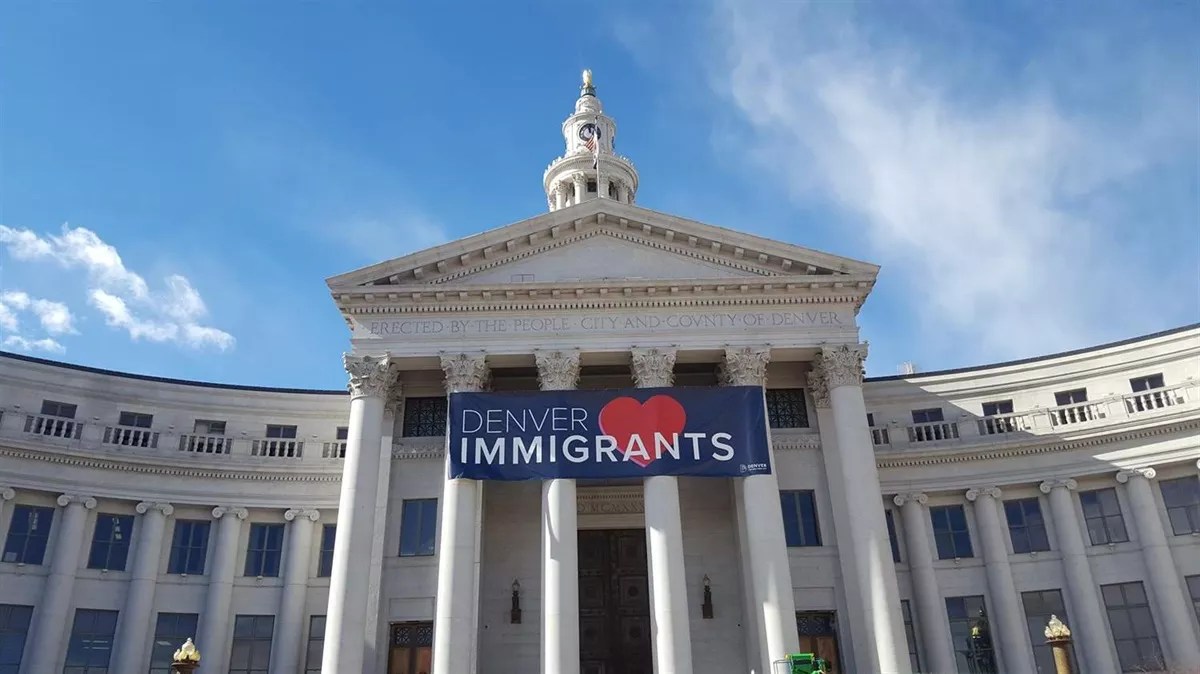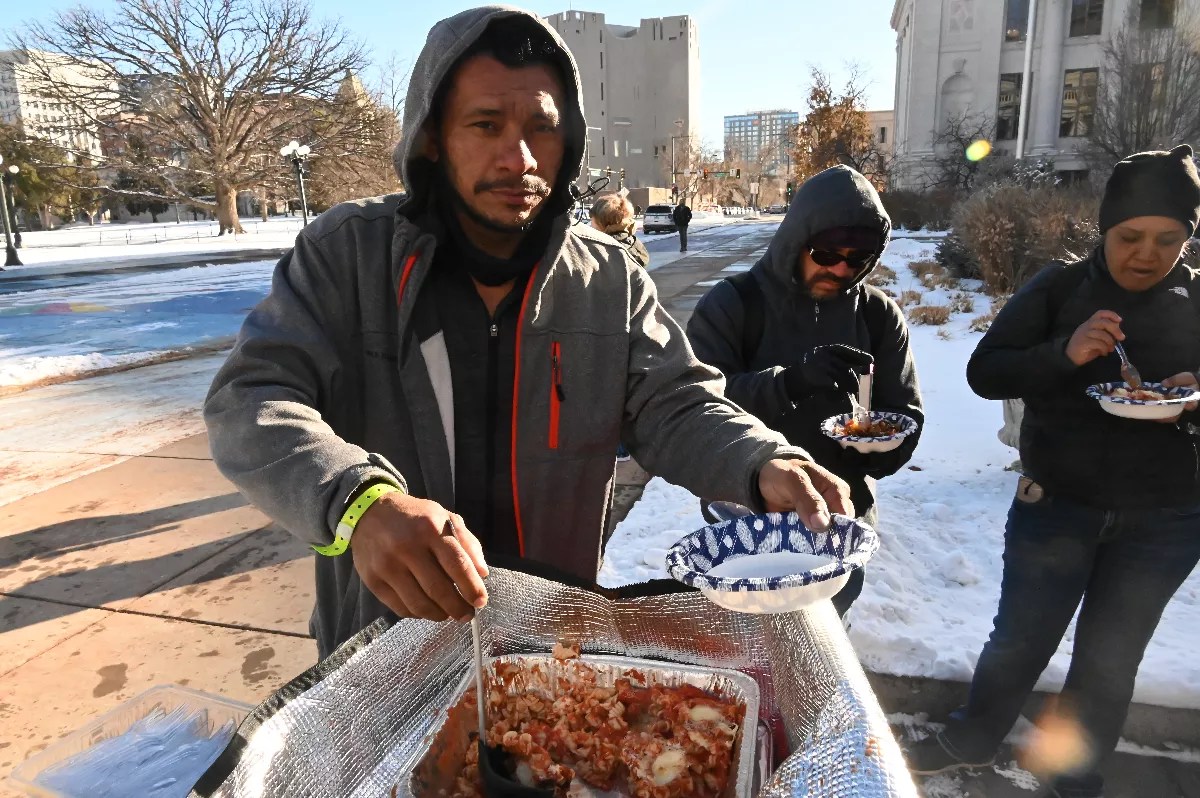
City and County of Denver

Audio By Carbonatix
As Denver deals with the dueling challenges of ending homelessness and handling an influx of migrants, the city’s politicians and the media have been caught in a war of the words.
While insisting that “sweeps” just isn’t an accurate description of what it prefers to call “encampment resolutions,” the City of Denver is also now inching away from “migrant” in favor of “newcomer.”
A week after Colorado Public Radio introduced “new immigrant” as its official replacement for “migrant,” Mayor Mike Johnston announced that Sarah Plastino would be the first director of the city’s Newcomer Program under the Department of Health & Human Services.
According to Cole Chandler, Johnston’s senior advisor on homelessness resolution, the mayoral administration favors “people-first language.” As often as possible, the mayor’s office tries to use terms like “people experiencing homelessness” and “people who use drugs,” he says. “It humanizes. We don’t just refer to people as ‘the homeless.'”
CPR, which has one of the largest newsrooms in the state, also stopped using “homeless” last year as both noun and adjective, in phrases like “homeless person” or “this person is homeless,” as a way “to avoid defining people by this particular moment in their lives,” says Sherkiya Wedgeworth-Hollowell, managing editor of accountability and outreach for the radio network.
“Instead, we say something like, ‘people experiencing homelessness,’ which points out that homelessness can be temporary,” Wedgeworth-Hollowell explains. “We also recognize the push to bring attention to the housing crisis and that some consider their tents as houses, so ‘houselessness’ and “unhoused’ are also terms that we use in our copy and in our language in the newsroom.”
But while CPR took that step, National Public Radio has not. And there continues to be plenty of debate – not to mention endless confusion -in the city over such terms as “sweeps,” “migrants,” “homeless” and, above all, “sanctuary city.”
Sweeps
Despite the city’s dogged determination to put an end to the word “sweeps,” it found its way back into headlines when the “No Freezing Sweeps” bill died in Denver City Council on February 12. The proposal would have banned city agencies from taking down structures like tents and moving their residents off the streets when the weather drops below 32 degrees.
The bill had initially passed council by a 7-6 vote on January 29, but Johnston promptly vetoed it – in the first veto of his administration. A super-majority of 9-4 was needed to override the veto, and council came up short.
“The things that we did not like about that bill is that it prevented us from doing ‘advisements,’ which are really important to keeping closed an area we already closed to camping,” Chandler says. “And then on the back end, we would have been able to bring people into housing, but we wouldn’t have been able to also simultaneously support that closure activity.
“We’re in alignment with the bill’s sponsors about not performing large-scale encumbrance removal at 32 degrees or below,” he adds. “We haven’t done that. It’s not going to be a practice of ours.”
And in any case, the Johnston administration doesn’t perform “sweeps,” he says, noting that an “encampment resolution” is “totally different.”
While a sweep is “moving someone down the block,” he says, with encampment resolutions, “we’re actually moving people into housing.” The two terms refer to “different functions,” Chandler notes, and the media “have to distinguish that; otherwise you’re not providing any information. You’re saying people are being moved down the block, and that’s not what’s happening.”

A rally outside City Hall pushed for the “No Freezing Sweeps” bill.
Bennito L. Kelty
When other city agencies take action to clear the streets, those aren’t “sweeps,” either, he notes. The Denver Police Department routinely performs “advisements,” Chandler says, telling people they’re violating the camping ban and need to move along. Activists have adopted the term “soft sweep” for such moves, because police also refer to advisements as “soft enforcement operations.”
The Lyall Settlement, a 2019 agreement between the feds and the City of Denver that set legal requirements for sweeps, uses the term “multiagency clean-up,” which Chandler says “is commonly referred to in the community as a sweep” because “the camp is just going to be moved down the block.” Multi-agency cleanups include clearing right-of-way encroachments when structures block public right-of-ways like streets and sidewalks.
The bottom line for Chandler is that sweep “is a pretty derogatory way to talk about humans. Sweeping is what you do with the trash on the floor, and that’s not the way we treat humans,” he says. But the administration isn’t just playing word games; it’s trying to bring attention to a shift in policies from the mayor’s office, he insists.
“The previous administration did not offer access to come indoors into housing when they addressed encampments. They just moved them down the block,” Chandler says. “We really want to move away from using those terms, but more than that, we want to move toward using policy that actually treats people like people and moves people indoors.”
Former mayor Michael Hancock tried out the term “encampment decommissioning” when he submitted his proposed budget in 2023. Johnston did use “sweep” early in his administration, at the first town hall discussing his House1000 plan, saying that “sweeps will continue where there are public health risks” or if a camp blocks a public right-of-way. He later opted for “encampment cleanup.”
CPR has considered whether it should use “sweeps,” Wedgeworth-Hollowell says, “which we recognize is pretty colloquial and at issue to some, but we’ve stuck with ‘sweeps’ since most people know the term and because it encompasses the myriad of reasons and ways the city can clear out tents on the streets.”
Migrants
Nearly 40,000 migrants have arrived in Denver, mostly from Venezuela, since December 2022; looking to humanize this issue, CPR recently adopted the term “new immigrants” for its coverage. On February 6, the network announced it was moving away from “migrant” after the editor of Denverite, a CPR product, suggested replacing the word to CPR’s Language Advisory Board, which includes Wedgeworth-Hollowell.
Subsequently, “migrants” was dropped as a “humanization effort,” she says. “There are lots of words that we use on the radio every day that have these things that we have to discuss and talk about, and this was one of those words. A lot of negative politics were attached to the word, and we didn’t want to have that negative politics attached to every story we’re writing about when it came to people coming to Colorado.”
As a substitute, CPR considered “asylum-seeker,” she notes, but “we can’t assume everyone here is seeking asylum.” And “refugee” was “just not the right word” because the South American migrants aren’t fleeing a war or natural disaster. “It came down to semantics and actual definitions of words,” she says, “and “new immigrant” seemed to fit best.
Although CPR didn’t officially consult migrants about the terminology, Wedgeworth-Hollowell says she talked with some shortly before the style change was made. “They didn’t care,” she says. “Believe me, that’s the least of their worries, the language that we’re using.” The style change “really wasn’t for them. It was for us. It was for Denverites, Coloradans.”
The new “newcomer” hire aside, Denver will continue to use the term “migrants” on its website and in official documents, says Jon Ewing, spokesperson for the Department of Human Services. Not only is “that what we’ve traditionally used,” but “they actually refer to themselves that way,” he notes.
Migrants “is a word that categorizes people who are foreigners in a country. It’s not offensive,” says Luis Alvarado, a Venezuelan migrant who came to Denver in May. “It’s a term to identify people who are in situations like what most of us have been through.”
Sanctuary City
When then-President Donald Trump threatened to pull federal funding from “sanctuary cities” in 2017, Denver had to figure out if it fit in that category – only to find that the label doesn’t have much of a definition in federal law or anywhere else.
“Since the term was coined in the 1980s, the meaning of ‘sanctuary city’ has been ephemeral and ever-changing,” wrote David Broadwell, then an assistant city attorney, in a 2017 memo. “Simply put, it has no precise definition, legal or otherwise.”
“Sanctuary city” generally refers to a city that commits to not helping enforce federal immigration laws and has immigration-friendly policies. But although Denver City Council passed an ordinance in 2017 limiting the city’s communications with Immigration and Customs Enforcement, the city has never declared itself a sanctuary city.
Denver may have been labeled a sanctuary city because of all the publicity over Jeanette Vizguerra, who took sanctuary at Denver’s First Unitarian Church in 2014 to avoid deportation; her story became national news in 2017. Denver was listed among the sanctuary cities targeted by ICE raids for Operation Safe City in 2017, and the Trump administration also included Denver on a list on “sanctuary jurisdictions” that it threatened to subpoena in 2018 for not cooperating with the feds.
Colorado may be considered a “sanctuary state” because of more recent legislation, including a 2019 law that protects Coloradans from having to disclose their immigration status and a 2023 law that keeps local jurisdictions from detaining immigrants for federal law enforcement. Colorado has never formally declared itself a sanctuary state, however.

A migrant gets a warm meal outside City Hall.
Bennito L. Kelty
Most of the migrants arriving in Denver are coming on buses sent from Texas. Greg Abbott, that state’s governor, has sent more than 100,000 migrants to Denver, New York City, Los Angeles and other “sanctuary cities as part of Texas’ migrant transportation strategy to relieve overwhelmed border towns,” according to a January 12 press release from his office.
Externally, Denver has been labeled a “sanctuary city” since the Wellington Webb administration decades ago, notes Alan Salazar, the last chief of staff for Mayor Hancock.
“It’s really a law enforcement argument. If you’re here with an undocumentated status, you want that person to be able to communicate with law enforcement – not immigration authorities, we’re talking about police officers or city officials – about potential crimes,” he says. “It’s a political label. It doesn’t really get at the challenges of managing a people problem.”
Sanctuary city is “a label that is put on cities that make the smart choice to have laws and procedures that don’t keep people in the shadows” by scaring them away from law enforcement for fear of deportation, Salazar explains. “You want people to come out of the shadows so their status can be resolved.”
But internally, Denver refers to itself as a “welcoming city,” following the lead of Hancock, who started using that term in 2017.
“Sanctuary city is so political, but we’re a welcoming place for migrants,” Ewing notes. Although the city does have “laws on the books essentially saying the federal government’s job is to enact its own federal policies and laws when it comes to immigration,” he says that the use of “welcoming city” gets Denver around that label.
“Everybody has a different definition for it,” Ewing says. “But we know what we mean when we say ‘welcoming city.’ We know what it says about where our values lie.”
And the definition is “all in the name,” Ewing concludes. “We consider ourselves a welcoming city. We consider ourselves a place that has traditionally put pride and put value on being welcoming to immigrants.”